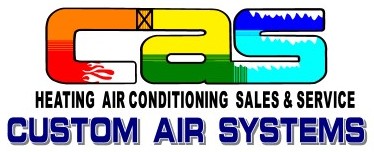Buying your first home is an exhilarating experience. You’re probably trying to keep track of numerous details about making the right choice. We believe that gaining insight into your potential new HVAC system is crucial. The property’s HVAC system represents a significant investment and potential source of long-term costs, which is why due diligence should be a top priority for first-time homebuyers.
In this guide, we’ll share seven tips for learning everything you can about a home’s heating and cooling system. And if you want a more in-depth opinion from the experts, don’t hesitate to contact Custom Air Systems. Our experienced team can share details about your options with industry insights that are second to none.
1. Which Kind of HVAC System Does the Home Use?
Start by identifying what specific HVAC system the home has. Furnaces generally last longer compared to air conditioners, and relatively new types of HVAC equipment like heat pumps boast average life spans that are impressively long. Getting the details on the make and specific model gives you a much better sense of how much routine maintenance it might need.
2. What Is the Current System’s Age?
It also helps to learn how old the HVAC system is when you’re considering a new home. On average, HVAC systems last about 10-12 years. Knowing when it was installed helps you plan for possible repair needs or when it might shut down for good. Older systems are more prone to problems, so planning ahead of time for a replacement unit could be necessary sooner than you thought.
3. What Does the Warranty Cover?
Don’t forget to look into whether the HVAC system is covered by a warranty. If it is, that’s great news because it can lower maintenance expenses. HVAC warranties should take care of parts and labor, but the details in each policy will vary. Review any terms you don’t recognize to make sure you fully understand your coverage and any possible out-of-pocket costs.
4. Has the System Ever Been Professionally Serviced or Maintained?
Next, examine the maintenance history of the HVAC system, if that information is accessible. This kind of information can demonstrate if there have been regular problems or how often maintenance is performed. Inquire about key tasks such as changing the air filter, which means it enjoyed more regularly scheduled tune-ups.
5. What Are the Energy Efficiency Ratings?
Finding a home that features an HVAC system with high energy efficiency isn’t just smart; it leads to lower utility bills and less of an impact on the environment. Try and find the seasonal energy efficiency ratio (SEER) ratings for air conditioning and the annual fuel utilization efficiency (AFUE) for furnaces. The higher the SEER rating, the more efficient the cooling over the whole season, while high AFUE ratings illustrate that the fuel is more effectively burned for useable heat.
6. Can You Spot Trouble During Your Inspection?
Even without the know-how of an HVAC technician, it’s still a good idea to examine the HVAC system yourself. Watch closely for signs of problems that weren’t mentioned by the seller or real estate agent. This can mean bizarre noises, unequal airflow and attempts to cover up any visible damage.
7. Have You Asked Your Local HVAC Professional?
If you’re unsure about the current state of the HVAC system, it’s beneficial to get input from experienced HVAC professionals. They can spot things you may not know about, such as leaks in the refrigerant, wiring issues or damaged ductwork.
A Consultation with Custom Air Systems Helps Take the Stress Out of Your Home-Buying Journey
Finding your first home ought to be exciting, and Custom Air Systems will do everything possible to ensure yours is too. Get in touch with us at (203) 333-1906. We can discuss how our HVAC services give you peace of mind, giving you what you need to step into your new home with confidence.
